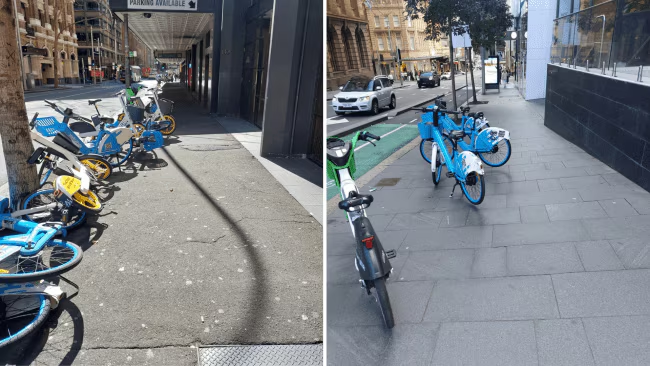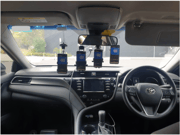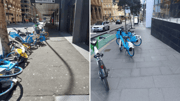
Those bright yellow, orange, and lime-green bikes scattered across our cities were meant to be the answer to urban transport woes. Instead, they've become the question mark cluttering our footpaths, and frankly, many of us are getting fed up.
A frustrated Sydney Reddit user summed up the feeling perfectly this week: 'So these are our streets forever? Pedestrians just have to walk around a company's advertising?'
The post, showing a pile of abandoned hire bikes, struck a nerve with thousands of Australians who've watched this grand transport experiment turn into an urban eyesore.
But here's what might surprise you: each day, around 5,300 trips are made on share bikes in the City of Sydney area, with 1.9 million share bike trips in 2024.
The numbers suggest people are using them, so why does it feel like such a disaster?
The uncomfortable truth: We're doing it all wrong
Let's be brutally honest about how Australia stacks up internationally. Australia is one of the countries with the lowest rate of trips per bike and per day: only 0.3 compared to 2—6 for countries overseas. That's not just disappointing—it's embarrassing.
'Australia is one of the countries with the lowest rate of trips per bike and per day: only 0.3 compared to 2—6 for countries overseas'
While cities across Europe and Asia seamlessly integrate bike sharing with public transport, most European and Asian cities are located in the high and medium-close integration cluster, while American cities tend to be more prevalent in the medium-far and no integration cluster—and unfortunately, Australia falls into the latter category.
Why we can't have nice things: The cultural problem
Research suggests there's something uniquely Australian about our bike sharing struggles. There are three key cultural reasons why a business model that could be successful in Singapore is much less likely to be so in Australia: power distance, individualism, and uncertainty avoidance.
Put simply, we're less likely to follow rules we don't personally agree with. Australians are much more likely to consider an edict from someone in authority as a general guideline or the starting point for negotiation, whereas Singaporeans are much more likely to take such messages literally.
The result? Australians are more likely to do what feels good for the individual in the short term rather than what's best for society in the long term.
So, at the end of a share-bike trip, an Australian is more likely to leave the bike in a non-designated area if it suits them than a Singaporean is.
The real-world mess we're left with
The statistics paint a grim picture of what happens when good intentions meet poor implementation.
Research shows that oBike and ReddyGo bikes were the most vandalized: 34 per cent and 50 per cent respectively, and field investigations highlighted that all the companies had GPS tracking defects which ranged from 67 per cent at ReddyGo to 10 per cent at Ofo.
The bike sharing reality check
Australia: 0.3 trips per bike per day
International average: 2-6 trips per bike per day
Vandalism rates: Up to 50 per cent of bikes damaged
GPS tracking failures: Up to 67 per cent of systems
Sydney secure parking spaces: Fewer than 100 citywide
But the problems go deeper than just inconvenience. As one Reddit commenter pointed out, 'They create a hazard for wheelchair users on the regular too'. This isn't just about aesthetics—it's about basic accessibility for people with disabilities trying to navigate our cities.
The situation has become so problematic that some hire bikes are even being used as vehicles for hate speech. Recent reports show bikes being defaced with swastikas or slogans such as 'Israel is hell,' 'Zionists are Nazis' and 'Israel is a terrorist state,' then driven around or left in neighborhoods with large Jewish populations.
What actually works: Learning from the best
The frustrating part is that bike sharing can work brilliantly when done right. Smart card contactless technology was successfully implemented at a large scale in 2005 in Lyon (Vélo'v) and in 2007 in Paris (Vélib'), and since then over 1000 bicycle sharing systems of this generation have been launched.
The key differences? Successful systems emphasize flexible, clean docking stations; bicycle redistribution innovations; smartcard integration with other transportation modes, such as public transit and carsharing; and technological advances including GPS tracking, touchscreen kiosks, and electric bikes.
Compare this to our approach. Sydney has fewer than 100 individual secure spaces while greater Melbourne has around 70 secure 'Parkiteer' sites. It's like trying to run a library without enough shelves.
The missed opportunities
The environmental promise that sold us on bike sharing is being squandered. Each day around 5,300 trips are made on share bikes in the City of Sydney area, resulting in a decrease in carbon emissions of 80—150g each trip.
Multiply that potential across the country and you're talking about meaningful environmental benefits—if only we could get the implementation right.
What we can learn from successful bike sharing cities
- Integrate with public transport systems (use your Opal card)
- Install proper docking stations, not free-floating chaos
- Create designated parking zones with penalties for misuse
- Invest in secure bike parking infrastructure
- Design systems that work with local culture, not against it
Research shows Melbourne's mandatory helmet laws initially hindered usage, but after introducing subsidised helmets, bicycle usage rate increased from 136 trips per day to 183 trips per day. Small changes can make big differences.
Solutions that could actually work
The Reddit community isn't just complaining—they're offering solutions. 'There should be designated places to park them like we have taxi ranks and bus stops. And you're charged extra for not putting them back,' suggested one user.
Another proposed: 'I reckon they should run them like public transport. One brand of bikes, tap your Opal card to use it. Build a bunch more cycleways AND a bunch of stations where you can leave them.'
These aren't pie-in-the-sky ideas. Transport Canberra announced a trial of the city's first dockless bike share program with new guidelines that insist on a collaborative response to 'enable the ACT Government to determine and mark appropriate locations where dockless share bikes may be parked'.
The bigger picture
Councils once welcomed dockless bikes as a cheap private solution to a public problem, yet they now frame regulations to contain the unwanted problem of bike parking rather than promoting the highly desirable solution of fewer cars in the city.
We've got this backwards. Instead of treating shared bikes as a nuisance to be managed, we should be designing cities that make them irresistible to use. The global expansion of bike-sharing networks offers a cost-effective and environmentally friendly transportation alternative that complements public transit and promotes active, healthy lifestyles - but only if we get the fundamentals right.
Did you know?
Did you know?
China's bike sharing boom reached 650,000 public bikes by 2013, with individual cities like Wuhan and Hangzhou operating 90,000 and 60,000 bicycles respectively—numbers that dwarf Australia's entire national fleet.
The irony is that bike share systems exist in over 1000 cities, and councils and governments are now planning for and welcoming the existence of bike sharing as a viable alternative to driving. Australia doesn't need to reinvent the wheel—we just need to learn from those who've already figured it out.
Time for a rethink
The current mess isn't inevitable. The benefits of a public bike system are still yet to be fully realised, and the introduction of electric shared bicycles further can only grow that benefit.
But this will require admitting that our current approach isn't working and learning from cities that have cracked the code. Whether it's Paris's Vélib', London's Santander Cycles, or Hangzhou's massive public bicycle system, the successful models all have one thing in common: proper infrastructure and integration with existing transport systems.
What This Means For You
The question isn't whether bike sharing can work in Australian cities—it's whether we're willing to do what it takes to make it work properly.
What's your experience with bike sharing in your city? Have you found yourself dodging abandoned bikes on footpaths, or have you discovered routes and systems that actually work well? Share your thoughts and experiences in the comments—because if we're going to fix this mess, we need to hear from the people actually trying to navigate it.
Original Article
https://www.kidspot.com.au/lifestyl...f/news-story/916a8df84504888f1274db6ca7bd9787
Bike sharing—City of Sydney
Cited text: Each day around 5,300 trips are made on share bikes in the City of Sydney area, resulting in a decrease in carbon emissions of 80—150g each trip. Ther...
Excerpt: each day around 5,300 trips are made on share bikes in the City of Sydney area, with 1.9 million share bike trips in 2024
https://www.cityofsydney.nsw.gov.au/guides/bike-sharing
Stationless in Sydney: The Rise and Decline of Bikesharing in Australia | Published in Findings
Cited text: Indeed, Australia is one of the countries with the lowest rate of trips per bike and per day: only 0.3 compared to 2—6 for countries overseas (9news 2...
Excerpt: Australia is one of the countries with the lowest rate of trips per bike and per day: only 0.3 compared to 2—6 for countries overseas
https://findingspress.org/article/7...-rise-and-decline-of-bikesharing-in-australia
Global comparison of urban bike-sharing accessibility across 40 cities | Scientific Reports
Cited text: Most of the European and Asian cities are located in the high and medium-close integration cluster. American cities tend to be more prevalent in the m...
Excerpt: most European and Asian cities are located in the high and medium-close integration cluster, while American cities tend to be more prevalent in the medium-far and no integration cluster
https://www.nature.com/articles/s41598-024-70706-x
Three reasons why share-bikes don’t fit Australian culture
Cited text: While there has been poor behaviour with share-bikes in Singapore, there are three key cultural reasons why a business model that could be successful ...
Excerpt: There are three key cultural reasons why a business model that could be successful in Singapore is much less likely to be so in Australia: power distance, individualism, and uncertainty avoidance
https://theconversation.com/three-reasons-why-share-bikes-dont-fit-australian-culture-90312
Three reasons why share-bikes don’t fit Australian culture
Cited text: Australians are much more likely to consider an edict from someone in authority as a general guideline or the starting point for negotiation, whereas ...
Excerpt: Australians are much more likely to consider an edict from someone in authority as a general guideline or the starting point for negotiation, whereas Singaporeans are much more likely to take such messages literally
https://theconversation.com/three-reasons-why-share-bikes-dont-fit-australian-culture-90312
Three reasons why share-bikes don’t fit Australian culture
Cited text: Australians and Singaporeans both know share-bikes should be returned to a designated parking space, but Singaporeans are more likely to be open to me...
Excerpt: Australians are much more likely to consider an edict from someone in authority as a general guideline or the starting point for negotiation, whereas Singaporeans are much more likely to take such messages literally
https://theconversation.com/three-reasons-why-share-bikes-dont-fit-australian-culture-90312
Three reasons why share-bikes don’t fit Australian culture
Cited text: If you add in the other differences in indulgence and long-term orientation, you can see why Australians are more likely to do what feels good for the...
Excerpt: Australians are more likely to do what feels good for the individual in the short term rather than what's best for society in the long term.
https://theconversation.com/three-reasons-why-share-bikes-dont-fit-australian-culture-90312
Stationless in Sydney: The Rise and Decline of Bikesharing in Australia | Published in Findings
Cited text: Results show that oBike and ReddyGo bikes were the most vandalized: 34 per cent and 50 per cent respectively, and that Mobike bikes were first when it came to helmet ...
Excerpt: Research shows that oBike and ReddyGo bikes were the most vandalized: 34 per cent and 50 per cent respectively, and field investigations highlighted that all the companies had GPS tracking defects which ranged from 67 per cent at ReddyGo to 10 per cent at Ofo
https://findingspress.org/article/7...-rise-and-decline-of-bikesharing-in-australia
Bike sharing—City of Sydney
Cited text: Shared bikes can be moved if they're blocking the way or you can contact the relevant operator. If a shared bike is causing a serious hazard, con...
Excerpt: 'They create a hazard for wheelchair users on the regular too'
https://www.cityofsydney.nsw.gov.au/guides/bike-sharing
Sydney electric bike sharing program is 'billboard' for antisemitism -- report | The Times of Israel
Cited text: Bikes are being defaced and then driven around or left in neighborhoods with large Jewish populations, the Australian Telegraph newspaper reported. Th...
Excerpt: Recent reports show bikes being defaced with swastikas or slogans such as 'Israel is hell,' 'Zionists are Nazis' and 'Israel is a terrorist state,' then driven around or left in neighborhoods with large Jewish populations
https://www.timesofisrael.com/sydne...program-is-billboard-for-antisemitism-report/
Bicycle-sharing system—Wikipedia
Cited text: The smart card contactless technology was experimented in Vienna (Citybike Wien) and implemented at a large scale in 2005 in Lyon (Vélo'v) and in 2007...
Excerpt: Smart card contactless technology was successfully implemented at a large scale in 2005 in Lyon (Vélo'v) and in 2007 in Paris (Vélib'), and since then over 1000 bicycle sharing systems of this generation have been launched
https://en.wikipedia.org/wiki/Bicycle-sharing_system
(PDF) Bikesharing in Europe, the Americas, and Asia: Past, Present, and Future
Cited text: These systems build upon the third generation and emphasize: 1) flexible, clean docking stations; 2) bicycle redistribution innovations; 3) smartcard ...
Excerpt: Successful systems emphasize flexible, clean docking stations; bicycle redistribution innovations; smartcard integration with other transportation modes, such as public transit and carsharing; and technological advances including GPS…
https://www.researchgate.net/public...the_Americas_and_Asia_Past_Present_and_Future
The Problem isn’t Dockless Share Bikes. It’s the Lack of Bike Parking
Cited text: Secure bike parking is provided in both cities, generally around public transport networks. However, Sydney has fewer than 100 individual secure space...
Excerpt: Sydney has fewer than 100 individual secure spaces while greater Melbourne has around 70 secure 'Parkiteer' sites
https://www.steadyrack.com/blogs/st...ess-share-bikes-it-s-the-lack-of-bike-parking
Bike sharing—City of Sydney
Cited text: Each day around 5,300 trips are made on share bikes in the City of Sydney area, resulting in a decrease in carbon emissions of 80—150g each trip.
Excerpt: Each day around 5,300 trips are made on share bikes in the City of Sydney area, resulting in a decrease in carbon emissions of 80—150g each trip
https://www.cityofsydney.nsw.gov.au/guides/bike-sharing
Melbourne Bike Share—Wikipedia
Cited text: The low popularity of the scheme in comparison to other cities was attributed to Melbourne's mandatory helmet laws, acknowledged by the government, wh...
Excerpt: Melbourne's mandatory helmet laws initially hindered usage, but after introducing subsidised helmets, bicycle usage rate increased from 136 trips per day to 183 trips per day
https://en.wikipedia.org/wiki/Melbourne_Bike_Share
Melbourne Bike Share—Wikipedia
Cited text: After the introduction of subsidised helmets, MBS bicycle usage rate increased to 183 trips per day.
Excerpt: Melbourne's mandatory helmet laws initially hindered usage, but after introducing subsidised helmets, bicycle usage rate increased from 136 trips per day to 183 trips per day
https://en.wikipedia.org/wiki/Melbourne_Bike_Share
The Problem isn’t Dockless Share Bikes. It’s the Lack of Bike Parking
Cited text: The Active Travel Office of Transport Canberra announced a trial of the city’s first dockless bike share program concurrently with new guidelines.
Excerpt: Transport Canberra announced a trial of the city's first dockless bike share program with new guidelines that insist on a collaborative response to 'enable the ACT Government to determine and mark appropriate locations where dockless share…
https://www.steadyrack.com/blogs/st...ess-share-bikes-it-s-the-lack-of-bike-parking
The Problem isn’t Dockless Share Bikes. It’s the Lack of Bike Parking
Cited text: The guidelines insist on a collaborative response to “enable the ACT Government to determine and mark appropriate locations where dockless share bikes...
Excerpt: Transport Canberra announced a trial of the city's first dockless bike share program with new guidelines that insist on a collaborative response to 'enable the ACT Government to determine and mark appropriate locations where dockless share…
https://www.steadyrack.com/blogs/st...ess-share-bikes-it-s-the-lack-of-bike-parking
The Problem isn’t Dockless Share Bikes. It’s the Lack of Bike Parking
Cited text: Councils once welcomed dockless bikes as a cheap private solution to a public problem. Yet they now frame regulations to contain the unwanted problem ...
Excerpt: Councils once welcomed dockless bikes as a cheap private solution to a public problem, yet they now frame regulations to contain the unwanted problem of bike parking rather than promoting the highly desirable solution of fewer cars in the…
https://www.steadyrack.com/blogs/st...ess-share-bikes-it-s-the-lack-of-bike-parking
Global comparison of urban bike-sharing accessibility across 40 cities | Scientific Reports
Cited text: The global expansion of bike-sharing networks offers a cost-effective and environmentally friendly transportation alternative that complements public ...
Excerpt: The global expansion of bike-sharing networks offers a cost-effective and environmentally friendly transportation alternative that complements public transit and promotes active, healthy lifestyles
https://www.nature.com/articles/s41598-024-70706-x
Public bikes | Bicycle Network
Cited text: Bike share systems exist in over 1000 cities. Councils and governments are now planning for and welcoming the existence of bike sharing as a viable al...
Excerpt: bike share systems exist in over 1000 cities, and councils and governments are now planning for and welcoming the existence of bike sharing as a viable alternative to driving
https://bicyclenetwork.com.au/tips-resources/bike-friendly-communities/public-bikes/
Public bikes | Bicycle Network
Cited text: The benefits of a public bike system are still yet to be fully realised. The introduction of electric shared bicycles further can only grow that benef...
Excerpt: The benefits of a public bike system are still yet to be fully realised, and the introduction of electric shared bicycles further can only grow that benefit
https://bicyclenetwork.com.au/tips-resources/bike-friendly-communities/public-bikes/







